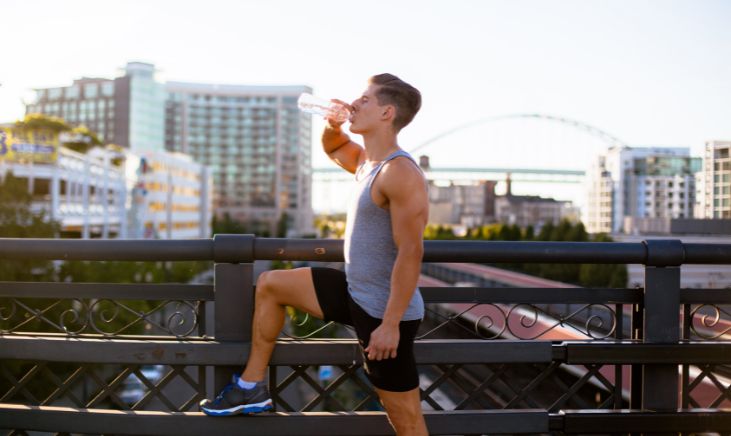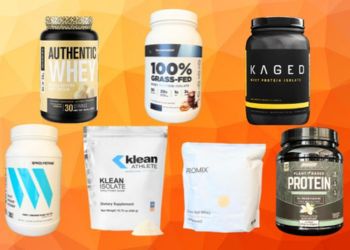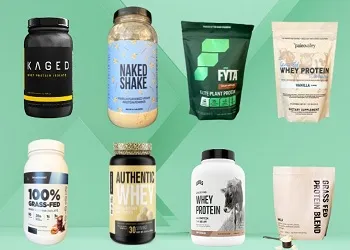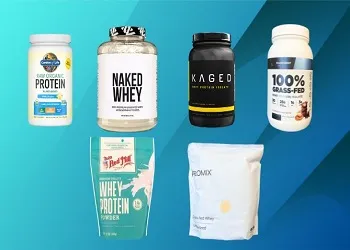So I’ll start by saying that the best workout recovery drink for most people is just plain water.
On the other hand, endurance athletes, those training for muscle growth, those who train in the heat, gym goers that workout for longer than 60 minutes, or heavy sweaters may benefit from different hydration options to refuel post workout.
Adequate workout recovery is vital to maintaining health and achieving fitness goals. If you want to want to know all there is to know about post workout drinks read ahead!
Researchers have actually developed a framework for post-workout nutrition (the 4 Rs). As a friendly reminder, refueling is just one of many components to recovery.
During a workout, glycogen is often depleted, electrolytes are lost, and muscle fibers are damaged through resistance exercise. Electrolytes are crucial to many bodily functions and an imbalance can lead to unpleasant side effects. After a workout, this muscle tissue is repaired and muscle protein synthesis (MPS) ramps up, which is essential for muscle growth. In this article, we’ll focus on macronutrient composition and electrolyte balance as the main points of refueling after exercise.
Table of Contents
Best Post Workout Drinks
- Fairlife Chocolate Milk – Most Accessible
- Nooma – Best Organic Sports Drink
- Pedialyte Sport – Best for Endurance Athletes
- Ultima Replenisher Lemonade Hydration Powder – Best Keto Friendly Hydration
- Nuun Hydration Sport Tablets – Best Hydration Tablets
Quick Overview
- For most casual gym goers, water is the cheapest, safest, and most accessible option for a post-workout drink.
- Post workout recovery drink recommendations vary based on exercise and activity type (endurance versus strength training), intensity, and length.
- For optimal recovery, try and refuel as soon as possible after a workout (within 2 hours) with adequate hydration and a snack or beverage with carbohydrates and protein.
- Overall, the best post workout drinks to maximize recovery are water, protein smoothies, chocolate milk, coconut water, electrolyte/hydration blends, and homemade smoothies.
Key Considerations for Choosing the Best Post-Workout Drink
Macronutrient Composition
When choosing the best supplements for pre and post-workout, macronutrient composition is going to be an important factor. The makeup of protein, carbohydrates, and fat in a food or supplement can indicate its effectiveness as a workout recovery aid.
Protein
As alluded to above, tiny tears in the muscle occur during resistance training, which is important for MPS. Adequate recovery can reduce delayed onset muscle soreness (DOMS), reducing the amount of time you need between sessions.
The optimal amount of quality protein to facilitate MPS after exercise is roughly 20–40 grams or 0.25–0.4 grams per kilogram of body weight for a more precise figure.
Research has illuminated that protein is best consumed alongside carbohydrates to be absorbed easier. The optimal ratio to look for in a post-workout meal is 3:1
(carbohydrates:protein); however, this is difficult to accomplish in a drink.
Carbohydrates
Glycogen is the primary source of energy used during physical activity. Replenishing glycogen stores with carbohydrates after exercise is an important aspect of exercise recovery. This is especially true for endurance athletes who are more likely to deplete their glycogen stores during exercise.
The amount of carbohydrates post exercise will vary based on intensity or duration of exercise as well as the time someone has to recover before the next bout of exercise. This nutrient timing is particularly important for endurance athletes training longer than 70 minutes, like marathon runners.
Fat Content & its Impact on Digestion & Nutrient Absorption
There isn’t much research on fat post workout, but there’s likely no need to add it in drinks or limit it. However, healthy fats are a crucial part of a well balanced meal, and something like organic MCT oil can be added to smoothies occasionally.
Hydration & Electrolyte Balance
Hydration and electrolyte balance are crucial aspects of post-workout recovery. If you start your workout dehydrated, it’s likely that you’ll remain dehydrated afterward. It’s important to drink water consistently throughout the day, including before, during, and after exercise. If plain water doesn’t appeal to you, try adding fruit slices or herbs to enhance the taste.
However, be cautious with flavor packets that may contain added sugars or artificial sweeteners, as they can cause gastrointestinal discomfort. Sparkling water can also be a refreshing option. Remember, hydration goes beyond water alone. Other liquids like tea, milk, and foods with high water content such as fruits and soups contribute to your overall hydration.
Hydrate During Your Workout!
Replenishing fluid loss during exercise is crucial. Physically active individuals can sweat anywhere from 0.3 to 2.4 liters per hour. Some individuals add salt to their water to help replace lost electrolytes. Electrolytes, including sodium, potassium, magnesium, chloride, and phosphate, play a vital role in muscle function and hydration and are lost in sweat. Maintaining this delicate balance impacts numerous bodily functions. Research suggests that a combination of electrolytes and carbohydrates may be more effective.
Dehydration or electrolyte imbalances can lead to muscle cramping, fatigue, headaches, dizziness, or a pounding heartbeat. Some studies indicate that electrolyte drinks may help prevent these issues. In endurance sports, sodium intake is particularly important.
Best Post-Workout Drinks
1. Water
To maintain proper hydration during exercise, it is recommended by the American Council on Exercise to drink 17 to 20 ounces of water two hours before your workout and continue with 7 to 10 ounces every 10 to 20 minutes during exercise. Additionally, a general guideline suggests consuming 16 to 24 ounces of water for every pound of body weight lost during exercise. While it’s important to stay hydrated, there’s no need to delve into excessive technicalities. Remember to listen to your body’s hydration needs and adjust your water intake accordingly.
2. Protein Shake & Smoothie
Any type of high-quality protein powder with all nine essential amino acids (EEAs) will be beneficial to consume post workout for muscle repair. Whey protein is just the most common protein powder for post workout and most researched as a tool to build muscle mass. The best recovery powder for you will depend on the type of training you do and your specific goals.
For those who prefer to follow a plant-based diet or have allergies or sensitivities, plant protein can serve the same purpose, but it may require a blend of different plant sources to create an optimal amino acid profile. However, this study shows that a combination of animal and plant-based protein creates the optimal amino acid profile.
Additional Ingredients & Supplements
There are several additional supplements and compounds marketed as beneficial to muscle recovery. Most post workout supplements can be blended into a smoothie or protein shake.
3. Chocolate Milk
Chocolate milk is a commonly used post workout drink as it has the ideal ratio of carbohydrates to protein, has natural electrolyte and hydration benefits, is cost effective, accessible, and tasty.
Fairlife Chocolate Milk – Most Accessible
Overview
Chocolate milk is an excellent post workout beverage, and Fairlife is great because it has a high protein and carb content without too much sugar.
Highlights
- Has a 1:1 carb to protein ratio
- Lactose free
- Contains:
- 13 g Protein
- 13 g Carbohydrates
- 280 mg Sodium
- 550 mg Potassium
- 280 mg Phosphorus
- 30 mg Magnesium
- 380 mg Calcium
Pricing
$5.29 (52 oz)
Bottom Line
Fairlife is a great brand found at many convenience stores and supermarkets, making it a nutritious and tasty option for a quick post workout beverage. If you’re after more protein, Fairlife’s Core Power line is similarly available.
4. Coconut Water
Like chocolate milk, coconut water is an excellent natural source of electrolytes and hydration, it is refreshing and accessible, and low in calories and high in potassium.
Nooma – Best Organic Sports Drink
Overview
Coconut water isn’t the only ingredient in Nooma’s organic sports drink blend, making it a great option for workout recovery. It has additional electrolytes and natural flavors to amplify ordinary coconut water.
Highlights
- USDA Organic
- Comes in six flavors
- Contains only natural ingredients
- Contains:
- 110 mg Sodium
- 340 mg Potassium
- 20 mg Magnesium
- 35 mg Calcium
Pricing
$29.99 (pack of 12, 16 oz drinks)
Bottom Line
Compared to others on the list, Nooma is quite low in electrolytes. However, if you’re someone who is just looking for a hydration boost rather than a full electrolyte replenisher, this is an awesome option.
5. Electrolyte & Hydration Blends
Most exercisers don’t really need added electrolytes or hydration from more than water. On the other hand, endurance athletes or those that engage in particularly sweaty workouts may benefit from electrolyte supplements.
Ultima Replenisher Hydration Powder – Best Keto Friendly
Overview
This powder can serve as a low carb, low sugar, and low calorie hydration solution. This product is available as powder packets or in a canister full of powder.
Highlights
- Comes in 10+ unique flavors
- Contains:
- 55 mg Sodium
- 250 mg Potassium
- 78 mg Chloride
- 70 mg Phosphorus
- 100 mg Magnesium
- 65 mg Calcium
Pricing
$20.99 (30 servings)
Bottom Line
Though replenishing with carbohydrates is a good idea post workout, for those following a low-carb diet, this formula may be a good option.
Pedialyte Sport – Best for Endurance Athletes
Overview
Pedialyte isn’t just for hangovers! The original Pedialyte solution is also a valuable hydration aid, but the brand has also developed a special sport line with added electrolyte concentrations.
Highlights
- Comes in three different flavors
- Contains:
- 650 mg Sodium
- 600 mg Potassium
- 920 mg Chloride
- 190 mg Phosphorus
- 55 mg Magnesium
Pricing
$47.96 (24 packets)
Bottom Line
Unless you’re doing some serious sweating or running marathons, you probably don’t need this level of electrolyte concentrations post workout. If you are, this is the most well regarded hydration mix on the market.
Nuun Hydration Sport Tablets – Best Hydration Tablets
Overview
These tablets can be dissolved into water and consumed before, during, or after a workout.
Highlights
- 13 flavors
- With or without caffeine
- NSF Certified for Sport
- Contains:
- 300 mg Sodium
- 150 mg Potassium
- 40 mg Chloride
- 25 mg Magnesium
- 13 mg Calcium
Pricing
$7.49 (10 servings)
Bottom Line
These dissolvable tablets can be an easy addition to your gym bag. They have an adequate amount of electrolytes to refuel after a variety of workouts but in amounts that aren’t overkill for most people.
6. Homemade Smoothie
Making a post-workout protein smoothie is a fantastic way to create a customizable and nutritious recovery beverage. The possibilities for smoothie combinations are endless, allowing you to experiment with various fruits, vegetables, and protein sources based on your preferences. Including vegetables in your smoothie not only adds nutritional value but also helps keep the sugar content low.
Post-workout smoothies are nutrient-dense and provide a refreshing boost after physical activity. In addition to a protein source of powder, Greek yogurt, or nut butter, consider adding healthy fats, greens, and fiber sources as well. Get creative and enjoy the benefits of a delicious and wholesome smoothie as part of your post-workout routine.
A Note on Timing
Sport scientists have been studying nutrient timing for decades now, and there is an optimal timeframe for drinking a recovery drink to promote muscle growth since muscle protein synthesis occurs right after resistance exercise. The ISSN stance is to consume 20–40 grams of protein within two hours post exercise. Dosage will vary based on individual requirements. However, the NASM recommends consuming protein within one hour and carbohydrates within 30 minutes post workout.
Conclusion
Ninety percent of the time, the best workout recovery beverage is just plain water. If you’re doing high-intensity, endurance training, losing a lot of sweat, or working out in the heat, the main things to consider when reaching for a great post workout supplement include ensuring it provides adequate protein, carbohydrates, and electrolytes (particularly sodium).
The most important thing to remember is to choose a post-workout drink based on personal preferences and dietary requirements. It may require experimentation to find the best post-workout drink that supports individual recovery and performance goals.
If you want help, book a consultation with a health and fitness expert at EverFlex to discuss your goals.
Frequently Asked Questions
What is the best drink after a workout?
For most people, the best thing to drink after a workout to rehydrate is water. However, for individuals that exercise for longer than 60 minutes, exercise in the heat, or lose a lot of water via sweat during a workout may benefit from electrolyte drinks.
What should I drink after a workout to build muscle?
The best drink to consume after a resistance or strength-based workout is a beverage composed of carbohydrates and protein at a 3:1 ratio. Examples of this include chocolate milk or a protein shake.
Is there a post workout drink?
There are several powders specifically for post workout recovery on the market that can be mixed with a liquid to form a post workout drink or added to smoothies. Other natural post workout drinks are plain water, coconut water, and chocolate milk.
What is the best post workout drink for weight loss?
Protein is crucial for weight loss and maintenance since it contributes to building lean muscle and increases satiety, or feelings of fullness.
Editorial Process:
Some of the links in this article could be affiliate links, which can provide us compensation at no cost to you if you decide to purchase supplements. These are products we personally stand behind. This site is not intended to provide personal health recommendations and you should connect with a registered dietitian or nutritionist before using any supplements.
References
Alghannam, A., Gonzalez, J., & Betts, J. (2018). Restoration of Muscle Glycogen and Functional Capacity: Role of Post-Exercise Carbohydrate and Protein Co-Ingestion. Nutrients, 10(2), 253. https://doi.org/10.3390/nu10020253
American College of Sports Medicine. (2007). Exercise and Fluid Replacement. Medicine & Science in Sports & Exercise, 39(2), 377–390. https://doi.org/10.1249/mss.0b013e31802ca597
Bonilla, D. A., Pérez-Idárraga, A., Odriozola-Martínez, A., & Kreider, R. B. (2020). The 4R’s Framework of Nutritional Strategies for Post-Exercise Recovery: A Review with Emphasis on New Generation of Carbohydrates. International Journal of Environmental Research and Public Health, 18(1), 103. https://doi.org/10.3390/ijerph18010103
Fox, A. K., Kaufman, A. E., & Horowitz, J. F. (2004). Adding fat calories to meals after exercise does not alter glucose tolerance. Journal of Applied Physiology, 97(1), 11–16. https://doi.org/10.1152/japplphysiol.01398.2003
Kerksick, C. M., Arent, S., Schoenfeld, B. J., Stout, J. R., Campbell, B., Wilborn, C. D., Taylor, L., Kalman, D., Smith-Ryan, A. E., Kreider, R. B., Willoughby, D., Arciero, P. J., VanDusseldorp, T. A., Ormsbee, M. J., Wildman, R., Greenwood, M., Ziegenfuss, T. N., Aragon, A. A., & Antonio, J. (2017). International society of sports nutrition position stand: nutrient timing. Journal of the International Society of Sports Nutrition, 14(1). https://doi.org/10.1186/s12970-017-0189-4
Liu, J., Klebach, M., Visser, M., & Hofman, Z. (2019). Amino Acid Availability of a Dairy and Vegetable Protein Blend Compared to Single Casein, Whey, Soy, and Pea Proteins: A Double-Blind, Cross-Over Trial. Nutrients, 11(11), E2613. https://doi.org/10.3390/nu11112613
Murphy, L. (n.d.). Nutrient Timing: What to Eat Before and After a Workout. Blog.nasm.org. https://blog.nasm.org/workout-and-nutrition-timing#:~:text=A%20good%20way%20to%20start
Rowlands, D. S., Kopetschny, B. H., & Badenhorst, C. E. (2021). The Hydrating Effects of Hypertonic, Isotonic and Hypotonic Sports Drinks and Waters on Central Hydration During Continuous Exercise: A Systematic Meta-Analysis and Perspective. Sports Medicine, 52. https://doi.org/10.1007/s40279-021-01558-y
The 10 Best Protein Powders to Build Muscle in 2022. (2022, June 2). Healthline. https://www.healthline.com/nutrition/best-protein-powder-to-build-muscle
Veniamakis, E., Kaplanis, G., Voulgaris, P., & Nikolaidis, P. T. (2022). Effects of Sodium Intake on Health and Performance in Endurance and Ultra-Endurance Sports. International Journal of Environmental Research and Public Health, 19(6), 3651. https://doi.org/10.3390/ijerph19063651














